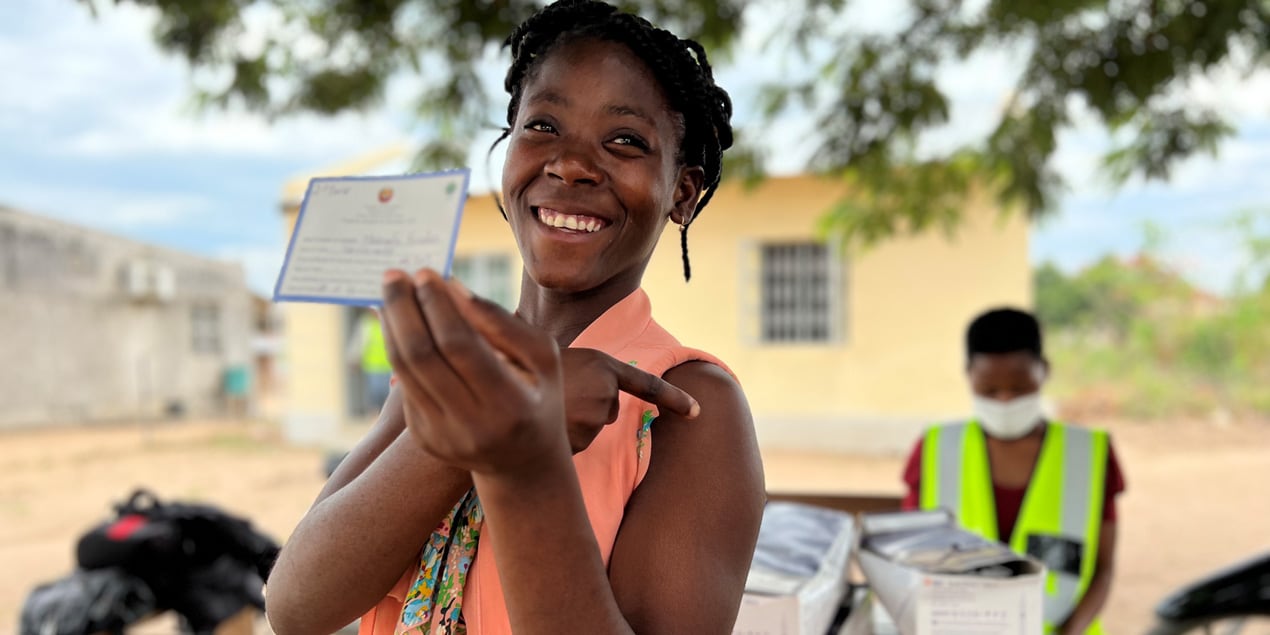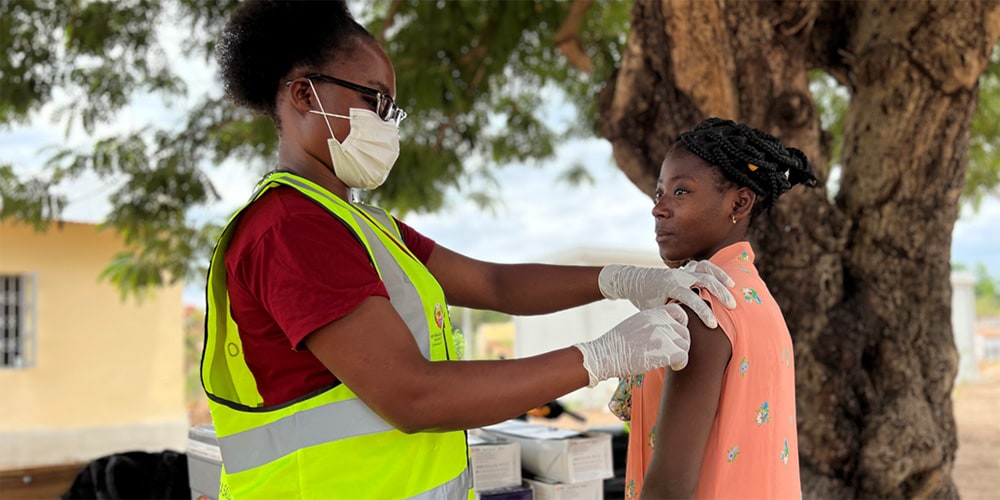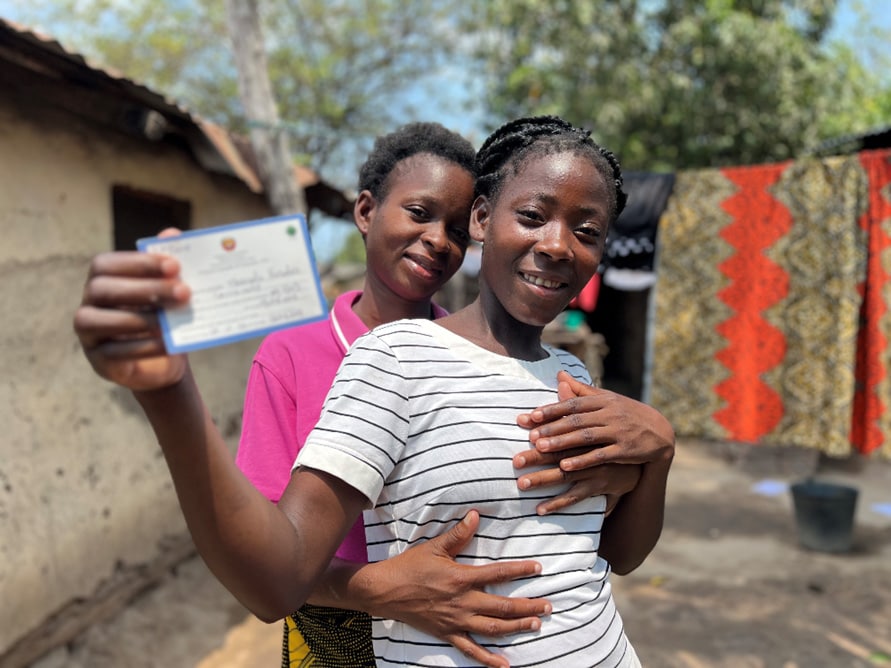Teenagers in Mozambique Participate in Countrywide COVID-19 Vaccination Campaign
Summary
- Health officials work with U.S. CDC-supported partner organization Friends in Global Health to get 12 to 17-year-olds in Mozambique vaccinated against COVID-19.
- Communication materials in several local languages helped many adolescents understand why it’s important to get the vaccine.
- Provincial health authorities in Zambézia reported the U.S. CDC-supported vaccination campaign resulted in 901,154 adolescents getting their primary series of COVID-19 vaccines. That’s 99.8% of the goal for this population.

Marcela Eusébio Antonio is at an outdoor CDC-supported vaccination site in Mopeia Sede, Mozambique. She points to her upper arm where she got her COVID-19 vaccine while holding her vaccine card up. Photo by Alfredo Mandlate/FGH
Marcela Eusébio Antonio is a 17-year-old living in the rural district of Mopeia in the Zambézia Province in Mozambique. Marcela got her second dose of the COVID-19 vaccine through a Ministry of Health (MOH) mobile vaccination brigade on November 21, 2022.
She decided to get vaccinated after learning that the COVID-19 vaccine is safe and that COVID-19 myths circulating in her community were not true.

A health worker at a U.S.CDC-supported vaccine site in Mozambique’s Zambézia Province gives Marcela Eusébio Antonio the COVID-19 vaccine. Photo by Alfredo Mandlate/FGH
Marcela says, “the information provided at school by the nurses and my teachers helped me make the decision to get vaccinated, to protect myself from the coronavirus. At the vaccination site, they also explained to me that after being fully vaccinated, if I get the coronavirus, I am less likely to develop serious symptoms and that made me more confident about getting the vaccine.”
Separating COVID-19 Fact from Fiction
The first case of COVID-19 was confirmed in Mozambique in March 2020.
The U.S. Centers for Disease Control and Prevention (U.S. CDC) partnered with the MOH and National Institute of Health (INS) for 23 years to establish and strengthen laboratory networks, disease surveillance, and increase the workforce available to respond to disease outbreaks.
U.S. CDC, MOH, and INS developed the overall strategy, operational plan, and budget for Mozambique’s COVID-19 response.
The relationships and partnerships built over time were invaluable to Mozambique’s COVID-19 response.
With support from the U.S. Government Initiative for Global Vaccine Access (Global VAX) through the U.S. CDC, the partner organization Friends in Global Health (FGH) suggested coordinating COVID-19 vaccination efforts in Mozambique, including the adolescent vaccination campaign that took place from September to November 2022.
FGH is an active member of the health ministry’s COVID-19 vaccination technical working group.
“CDC’s Country Office in Mozambique worked closely with partners such as FGH to support the country’s COVID-19 vaccination campaign,” said Jolene Nakao, MD, CDC Mozambique’s senior advisor for public health response. “With their strong, longstanding relationships in local communities, the vaccination campaign in Zambézia Province and across the country led many Mozambicans to be protected against serious COVID-19 illness.”
The team created general information, education, and communication materials like posters and flyers that were used throughout the country.
They even created theater productions as a way to inform people about the benefits of getting the COVID-19 vaccine.
In the Zambézia Province on the central coast of Mozambique, FGH provided logistical support to provincial health authorities. They brought community members, religious and political leaders, and other local influencers together to participate in radio and television spots and debates. These efforts helped explain why people should get vaccinated and addressed COVID-19 misinformation that was circulating and preventing many from getting the shot.
Coordination between the education and health sectors was also essential to ensure that teachers were trained by health professionals so they could provide correct COVID-19 vaccination information.
“We participated in strategic meetings with health authorities, where we understood the importance of vaccine uptake from the adolescent target group and clarified the most common doubts and myths around the vaccine. Before vaccination, we organized public meetings together with health personnel to explain to students the benefits of this preventive measure,” says João Jorge, who is the lead contact for the Health in Schools program in the Mopeia District.
Young People Step Up and Get the Vaccine
Neusa Francisco Rainde, Marcela´s older sister and guardian, was glad when young people between the ages of 12 and 17 were eligible to get the COVID-19 vaccine. She was very worried that teenagers like her younger sister were still unprotected.
“I was very pleased to know the time had come for younger ones to get vaccinated,” says Rainde. “As Marcela’s older sister, I was concerned that she was at risk of getting COVID-19 and developing serious symptoms. Knowing that she is vaccinated makes me feel calm because I know she is protected against coronavirus,” she adds.
According to provincial health authorities in Zambézia, the U.S. CDC-supported vaccination campaign resulted in a total of 901,154 adolescents getting their primary series of COVID-19 vaccines. That’s 99.8% of the eligible population and put Mozambique one step closer to achieving the goal of getting 4.8 million 12- to 17-year-olds vaccinated.
With so many young people being up to date with their primary COVID-19 vaccinations, health officials in Mozambique are now focusing on getting them booster shots so they continue to be protected.

Neusa Franciso Rainde hugs her sister Marcela Eusébio Antonio, who is holding up her COVID-19 vaccination card. Photo by Alfredo Mandlate/FGH